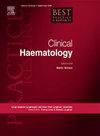精确免疫调节:理解和利用细胞因子途径治疗和预防免疫相关不良事件(irAEs)
IF 2
4区 医学
Q3 HEMATOLOGY
引用次数: 0
摘要
免疫检查点抑制剂的使用从根本上改变了多种恶性肿瘤的治疗前景以及我们对癌症生物学的理解。尽管取得了长足的进步,但这些药物的使用往往受到免疫相关不良事件(irAEs)的限制,其特征是治疗后对健康组织的脱靶毒性。目前,irAEs通常使用高剂量皮质类固醇治疗,对严重或难治性irAEs添加额外的免疫抑制剂。细胞因子途径抑制剂,特别是抗tnfa和抗il - 6r抗体,通常被用作二线免疫抑制。我们将讨论阻断这些途径在治疗irae中的功效,以及它们对抗肿瘤反应的潜在影响。此外,本综述还将探讨与irAE病理生理相关的其他细胞因子,包括白细胞介素-17 (IL-17)、白细胞介素-23 (IL-23)、白细胞介素-4/13 (IL-4/IL-13)和白细胞介素-5 (IL-5),它们在特异性irAE的炎症级联反应中发挥重要作用,如结肠炎、皮炎和嗜酸性粒细胞相关毒性。本文章由计算机程序翻译,如有差异,请以英文原文为准。
Precision immunomodulation: Understanding and harnessing cytokine pathways to treat and prevent immune-related adverse events (irAEs)
The utilization of immune checkpoint inhibitors has fundamentally changed both the treatment landscape for a multitude of malignancies as well as our understanding of cancer biology. Despite profound advancements, the utilization of these drugs is often limited by the development of immune-related adverse events (irAEs), characterized by off-target toxicity to healthy tissue secondary to treatment. Currently, irAEs are often treated with high-dose corticosteroids, with additional immunosuppressive agents added for severe or refractory irAEs. Cytokine pathway inhibitors, particularly anti-TNFa and anti-IL-6R antibodies, are commonly used as second-line immunosuppression. The efficacy of blocking these pathways in treating irAEs, as well as their potential impact on anti-tumor response, will be discussed. Additionally, this review will also explore other cytokines implicated in irAE pathophysiology, including interleukin-17 (IL-17), interleukin-23 (IL-23), interleukin-4/13 (IL-4/IL-13) and interleukin-5 (IL-5) which play important roles in the inflammatory cascades underlying specific irAEs such as colitis, dermatitis, and eosinophilia-related toxicities.
求助全文
通过发布文献求助,成功后即可免费获取论文全文。
去求助
来源期刊
CiteScore
4.20
自引率
0.00%
发文量
42
审稿时长
35 days
期刊介绍:
Best Practice & Research Clinical Haematology publishes review articles integrating the results from the latest original research articles into practical, evidence-based review articles. These articles seek to address the key clinical issues of diagnosis, treatment and patient management. Each issue follows a problem-orientated approach which focuses on the key questions to be addressed, clearly defining what is known and not known, covering the spectrum of clinical and laboratory haematological practice and research. Although most reviews are invited, the Editor welcomes suggestions from potential authors.

 求助内容:
求助内容: 应助结果提醒方式:
应助结果提醒方式:


